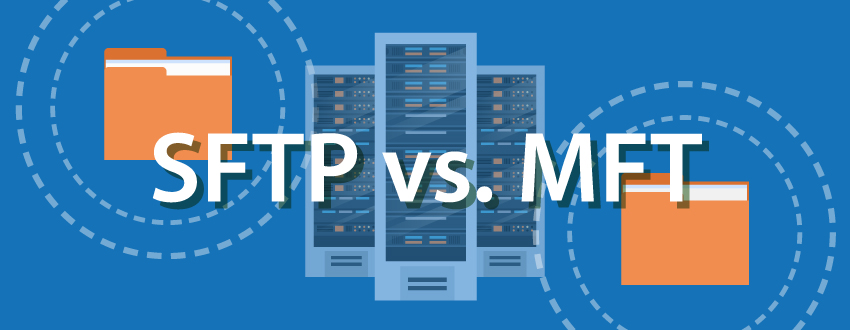
SFTP, or MFT: that is the question.
Even though we’re not all famous poets like William Shakespeare, many IT professionals will ask this question at some point or another. Should they use an SFTP or managed file transfer (MFT) solution to transfer sensitive files securely—and why?
It brings up an interesting choice. By nature, SFTP and MFT solutions both work to protect data in transit. They both authenticate trading partner connections with a combination of user IDs, passwords, or keys, and they both help satisfy strict requirements for data security laws like PCI DSS, HIPAA, and the GDPR.
So what’s the difference? Is one better than the other for your organization?
Let’s dig into this age old question and find out.
What is SFTP?
SFTP (which stands for FTP over SSH) is a secure FTP protocol that transmits files over secure shell (SSH). SSH gives SFTP its secure "oomph" because it provides organizations with a high level of protection for its file transfers. SFTP also implements AES, Triple DES, and similar algorithms to encrypt the files that transfer between systems.
For authentication, SFTP users have several choices. They can test a connection with a user ID and password, an SSH key, or a combination of a password and SSH key. This is highly beneficial for organizations that need to implement stronger security measures around their file transfer processes and user access.
Related Reading: GoAnywhere Glossary
Organizations can purchase inexpensive SFTP file transfer tools, but these tools rarely offer automation, auditing, monitoring, or other key features that make file transfers easier, more secure, and more affordable to execute.
What is Managed File Transfer?
Managed File Transfer (MFT) is a solution that encompasses all aspects of file transfer processes, including workflows, security, administration, and auditing, from a centralized interface. Instead of only sending secure file transfers like an SFTP client does, MFT solutions also protect data at rest, schedule and automate batch transfers, encrypt files with industry standards like Open PGP and AES, allow users to safely collaborate with others in the cloud or on-premises, track file transfer activity for compliance and reporting, and much more.
Explore the features an MFT file transfer solution has to offer >
MFT file transfer solutions do everything SFTP tools can do, and then some. Managed file transfer is worth considering for organizations that want to simplify their file transfer processes from multiple tools or legacy scripts down to a single solution that easily integrates with web and cloud services like SharePoint, Dropbox, and JIRA.
When to Choose SFTP vs. MFT
Shall I compare SFTP to MFT? (Both art more lovely and more temperate than FTP.)
Choose an SFTP solution if...
If you need a free or otherwise inexpensive way to send and receive secure file transfers to a handful of trading partners, an SFTP server and client tool might suit you. You can achieve basic needs like authenticating your users, transferring unlimited files per server connection, and controlling your port usage.
Choose an MFT solution if...
If you need a way to streamline all aspects of your file transfers, a managed file transfer solution is the better choice.
With MFT, you can choose to transfer files using several secure FTP protocols, including SFTP, FTPS, HTTPS, and AS2. Alerts are sent by email, text, or system message for any file transfer failures, connection retry and auto-resume are available, and every SFTP (or other secure FTP protocol) transmission is tracked and audited to help you meet strict in-house and compliance requirements.
MFT solutions can also help with initiatives like automation, user-to-user file sharing, clustering for maintaining maximum high availability, web and cloud integrations for popular applications, and PDF reports on critical system information.
What can MFT do for you? Watch this short video:
So, Which One is Better?
While MFT gives you the best of both worlds, which one you choose is entirely up to your current business needs. A modest budget or file transfers that are sent few and far in between might just require an SFTP server or client solution. If you don’t often work with sensitive files, SFTP may also be enough to fit your security requirements.
However, a managed file transfer solution offers organizations of all sizes a lot more value than simple file transfers. If your considerations include compliance, automation, or auditing, or if you exchange a high volume of file transfers a day, a managed file transfer solution can help you simplify your processes, free up precious resources, and achieve a positive ROI.
Explore Everything Managed File Transfer Can Offer You
Learn how a secure file transfer solution can reduce human errors, save valuable time and resources, and comply with strict security standards with a personalized demo led by one of our experts.
